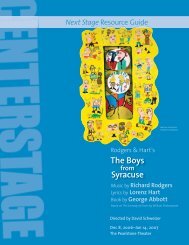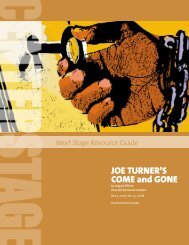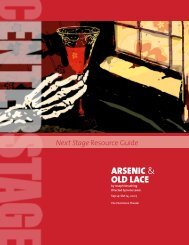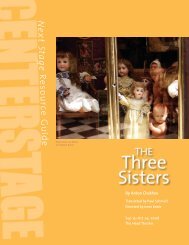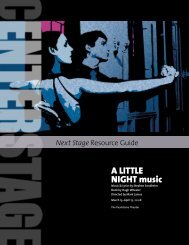The Matchmaker - Center Stage
The Matchmaker - Center Stage
The Matchmaker - Center Stage
You also want an ePaper? Increase the reach of your titles
YUMPU automatically turns print PDFs into web optimized ePapers that Google loves.
Why Farce?<br />
Farce is a genre<br />
that gets a bad rap,<br />
and you can see why. Its scenes are a crazy<br />
quilt of slamming doors, men hiding in<br />
closets, and constant cross-dressing. To<br />
a disapproving eye, the form is shallow;<br />
to a puritanical one, it’s positively<br />
pornographic. And yet, for the dramatic<br />
frame of <strong>The</strong> Merchant of Yonkers—written<br />
mere months after Our Town premiered<br />
on Broadway—Thornton Wilder rejected<br />
the famously unadorned stage that had<br />
surprised and charmed audiences in his<br />
previous triumph, choosing instead to<br />
play within the sandbox of this gleefully<br />
lowbrow, vigorously knockabout genre. Why<br />
would Wilder forsake the poetic heights of<br />
Our Town’s final act, a graveyard scene that<br />
brilliantly distills the eternity of the cosmos,<br />
for the quotidian bluster of farce? And in<br />
Yonkers, of all places!<br />
Farce’s low reputation may also stem from<br />
its plainspoken ability to appeal throughout<br />
the ages to audiences of all kinds—<br />
precisely the qualities that Wilder admired<br />
and sought to recreate. Its golden ages tend<br />
to accompany eras in which the little man<br />
attains a sense of self, and its artistic homes<br />
have traditionally been of the low-rent<br />
variety. Never was this truer than in the 19 th<br />
and early 20 th Centuries—the period from<br />
which Wilder draws the sources and setting<br />
of <strong>The</strong> Merchant of Yonkers, which would<br />
become <strong>The</strong> <strong>Matchmaker</strong>.<br />
In the Paris of Feydeau and Labiche, the<br />
Vienna of Raimund and Nestroy, or the<br />
flickering silent films of Buster Keaton and<br />
Charlie Chaplin, the little man occupied<br />
the center of the frame, in the midst of a<br />
relentlessly moving, stimulatingly chaotic<br />
world. It was an increasingly industrial<br />
age, and the form consequently became<br />
mechanized. A good farce began to<br />
resemble a dramaturgical dynamo—an<br />
energy generator of reversals in action<br />
that hurtles ever faster toward a pleasingly<br />
inevitable catastrophe.<br />
by Drew Lichtenberg, Associate Dramaturg<br />
In <strong>The</strong> <strong>Matchmaker</strong>, Thornton Wilder<br />
preserves farce’s social reach and inherent<br />
vigor, but he was wary of its mechanical<br />
imperative. As he writes in an illuminating<br />
essay, Noting the Nature of Farce, the<br />
genre’s twin drives toward “logic and<br />
objectivity” leave no room for the human.<br />
“A ‘pure’ farce would be all pattern and<br />
would admit no mixture,” and it would<br />
“dare not lean too far toward the exposition<br />
of character.” Uninterested in building<br />
robots, Wilder characteristically retains<br />
the unpretentious style of Our Town,<br />
and its cast of ordinary Americans, and<br />
revs up the comic engine. As a result, <strong>The</strong><br />
<strong>Matchmaker</strong>, for all its brazen swagger,<br />
contains emotional truths just as rich and<br />
resonant as those in his previous work.<br />
Everyone recognizes Cornelius’s youthful<br />
elation when he describes the fascinating<br />
woman he’s just met, or can empathize<br />
with older characters who still yearn for<br />
some sensation with their sensibility.<br />
“My play is about the aspirations of the<br />
young (and not only the young) for a fuller,<br />
freer participation in life,” Wilder wrote of<br />
<strong>The</strong> <strong>Matchmaker</strong> in the 1956 preface to his<br />
Three Plays, concluding with an extended<br />
comparison between his creation and<br />
Johann Nestroy’s original text:<br />
Imagine an Austrian pharmacist<br />
going to the shelf to draw from<br />
a bottle which he knows to<br />
contain a stinging corrosive liquid,<br />
guaranteed to remove warts and<br />
wens; and imagine his surprise<br />
when he discovers that it has been<br />
filled overnight with very American<br />
birch-bark beer.<br />
Wilder’s treatment is an altogether<br />
different chemical composition—modeled<br />
on its forebear but infused with the<br />
vitality of the New World, as sweet as<br />
it is sharp.<br />
Next <strong>Stage</strong>: <strong>The</strong> <strong>Matchmaker</strong> |



